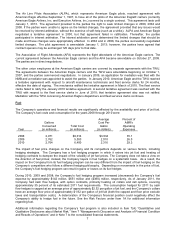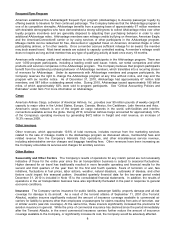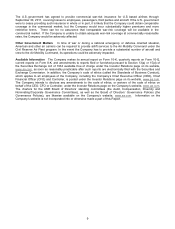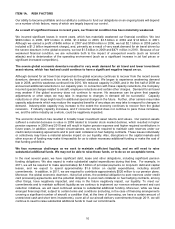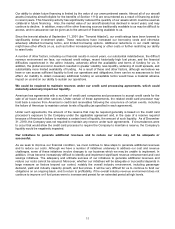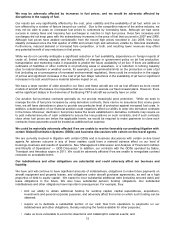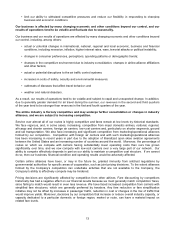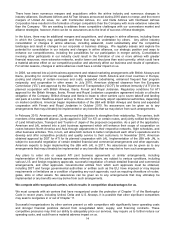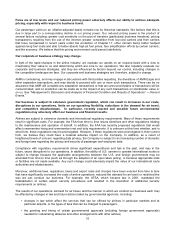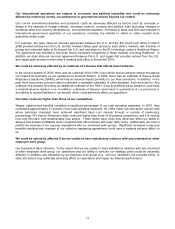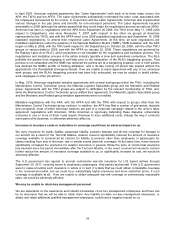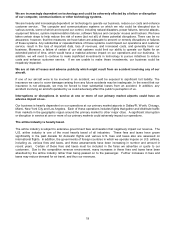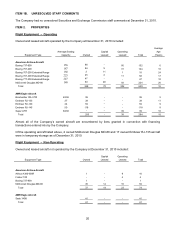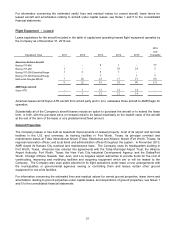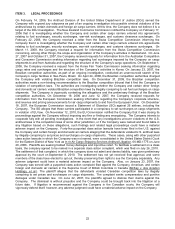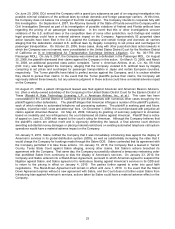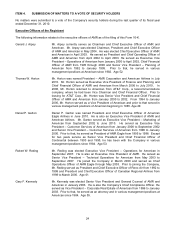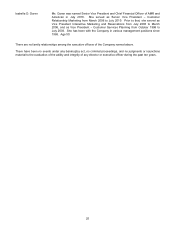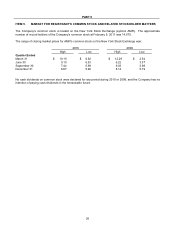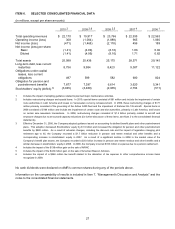American Airlines 2010 Annual Report Download - page 20
Download and view the complete annual report
Please find page 20 of the 2010 American Airlines annual report below. You can navigate through the pages in the report by either clicking on the pages listed below, or by using the keyword search tool below to find specific information within the annual report.
17
Our international operations are subject to economic and political instability and could be adversely
affected by numerous events, circumstances or government actions beyond our control.
Our current international activities and prospects could be adversely affected by factors such as reversals or
delays in the opening of foreign markets, exchange controls, currency and political risks (including changes in
exchange rates and currency devaluations), environmental regulation, increases in taxes and fees and changes in
international government regulation of our operations, including the inability to obtain or retain needed route
authorities and/or slots.
For example, the open skies air services agreement between the U.S. and the EU which took effect in March
2008 provides airlines from the U.S. and EU member states open access to each other’s markets, with freedom of
pricing and unlimited rights to fly beyond the U.S. and any airport in the EU including London’s Heathrow Airport.
The agreement has resulted in American facing increased competition in these markets, including Heathrow. In
addition, an open skies air services agreement between the U.S. and Japan that provides airlines from the U.S.
and Japan open access to each other’s markets took effect in November 2010.
We could be adversely affected by an outbreak of a disease that affects travel behavior.
In the second quarter of 2009, there was an outbreak of the H1N1 virus which had an adverse impact throughout
our network but primarily on our operations to and from Mexico. In 2003, there was an outbreak of Severe Acute
Respiratory Syndrome (SARS), which had an adverse impact primarily on our Asia operations. In addition, in the
past there have been concerns about outbreaks or potential outbreaks of other diseases, such as avian flu. Any
outbreak of a disease (including an additional outbreak of the H1N1 virus) that affects travel behavior could have
a material adverse impact on us. In addition, outbreaks of disease could result in quarantines of our personnel or
an inability to access facilities or our aircraft, which could adversely affect our operations.
Our labor costs are higher than those of our competitors.
Wages, salaries and benefits constitute a significant percentage of our total operating expenses. In 2010, they
constituted approximately 31 percent of our total operating expenses. All of the major hub-and-spoke carriers with
whom American competes have achieved significant labor cost savings through or outside of bankruptcy
proceedings. We believe American’s labor costs are higher than those of its primary competitors, and it is unclear
how long this labor cost disadvantage may persist. These higher labor costs may adversely affect our ability to
achieve and sustain profitability while competing with other airlines with lower labor costs. Additionally, we cannot
predict the outcome of our ongoing negotiations with our unionized work groups. Significant increases in pay and
benefits resulting from changes to our collective bargaining agreements could have a material adverse effect on
us.
We could be adversely affected if we are unable to have satisfactory relations with any unionized or other
employee work group.
Our business is labor intensive. To the extent that we are unable to have satisfactory relations with any unionized
or other employee work group, our operations and our ability to execute our strategic plans could be adversely
affected. In addition, any disruption by an employee work group (e.g., sick-out, slowdown, full or partial strike, or
other job action) may materially adversely affect our operations and impair our financial performance.


